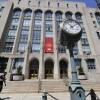At the Massachusetts State House on Tuesday morning, community activists and members of the Massachusetts Commission on LGBTQ Youth gathered on the steps in support of trans youth.
The rally came ahead of Trans Day of Visibility on March 31, which, in Washington, D.C., will culminate with the March for Queer & Trans Youth Autonomy. It will be the first major queer and trans-led demonstration in the nation’s capital.
“We’re just here to say that we deserve gathering not just on hot June parades, but also on wet March mornings,” said North American Indian Center of Boston civic engagement coördinator Reggi Alkiewicz during their address to the crowd.
It was evident that the damp chill of early spring did not temper the enthusiasm radiating from Beacon Street. Commission executive director Shaplaie Brooks emphasized the commonwealth’s legacy of pioneering social initiatives and the necessity that it remain at the vanguard of progressivism: Massachusetts is the first state to have such a commission centered on the wellbeing of LGBTQ youth.
But the commission is counted as but one victory, and Brooks was vocal about the need for continuous political engagement. She pointed to the nationwide statistics: 434 bills in U.S. state legislatures target LGBTQ people, according to a tracker from the ACLU.
“Consider this the home base for the national march that’s in Washington this Friday,” Brooks exclaimed during her remarks.
Even if Massachusetts isn’t one of the several states that has already passed explicitly anti-trans legislation, such sentiment still exists here: a group including apparent neo-Nazis interrupted a drag story hour in Taunton, and Boston Childrens’ Hospital has received multiple bomb threats from harassers over the gender-affirming care the hospital provides.
“Thanks to MassEquality, we know that in Massachusetts alone, there are 48 districts and counting that have anti-LGBTQ activity,” Brooks said.
Commission vice chair Noemi Uribe reiterated that the state should focus on proactive legislation to combat this antagonism: “Even though we don't have legislation or filed bills right now that are anti-LGBTQ or anti-trans, that activity is still something we need to listen to, and we need to call on legislators to pass protections to prevent anything from happening.”
Despite the energy at the rally, the event was also an indicator of the remaining work to be done: in the crowd there was a conspicuous lack of Black youth, something that co-chair Craig Martin acknowledged.
“Our youth of color don’t always have the spaces where they can feel brave and be public, because they are generally the ones who are most targeted, experience the most violence, and actually seem to be invisible in the very sphere of the community,” he said. “Not having them here means we still have a lot more work to do to create a brave space for them to come out and just be in community.”
A part of that work includes the commission’s annual report, due April 27, that provides “evidence-based and community-sourced recommendations” to both the state Legislature and statewide agencies, outlining policies and programs to secure the well-being of LGBTQ youth.








